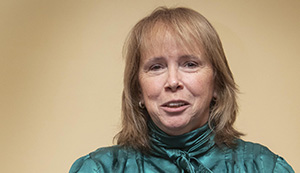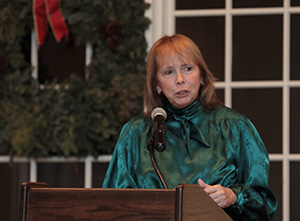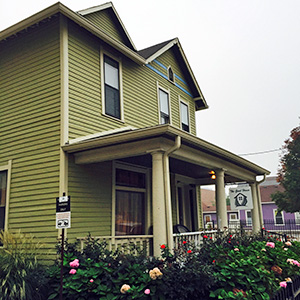Patient advocate offers a sanctuary for loved ones to gather and rest

Families who fight cancer along with their ailing loved one grapple with many issues, from health decisions and a myriad of emotions to logistical and financial concerns. The range of concerns is something Becky Armbruster, this year’s Terry Hoeppner Patient Advocacy Award winner, recalls very poignantly.
From the time her late husband, Doug, underwent treatment at the Indiana University Melvin and Bren Simon Cancer Center for myelofibrosis, a bone marrow disorder that interrupts a body’s production of blood cells, she learned how other families were coping and spending time.
“You start finding out that people are sleeping at the hospital because they don’t have the money to stay at a hotel and families are piled into waiting rooms because there’s no place to stay,” says Armbruster.
She says she felt very fortunate that she and her husband, a retired Benedictine monk, lived in Indianapolis and did not have to travel far for his treatment but was distraught that other families had traveled long distances and had nowhere comfortable to stay.
Armbruster decided to address this need after her husband passed away from complications from the bone marrow transplant, including kidney failure.
She opened The Good House in 2012, in the historic Lockerbie area, to accommodate families with loved ones who were undergoing cancer treatment a few miles away.
Since its founding, The Good House has accommodated thousands of families with a comfortable place to sleep, eat, and gather. The home provides the warm, quiet atmosphere families need at a critical time. The Good House features four private bedrooms, a kitchen, living room, laundry room, and storage facility.
The Hoosier Cancer Research Network recently recognized Armbruster for her compassion, patient advocacy, and effort in establishing The Good House by honoring her with the 2018 Terry Hoeppner Patient Advocacy Award. The award was established in memory of the revered Indiana University football coach, Terry Hoeppner, who died from brain cancer in 2007. Every year, the award honors individuals who exhibit Coach Hoeppner’s spirit and determination.
“Becky is a very special person,” says Christopher Fausel, PharmD, MHA, BCOP, chairman of HCRN Board of Directors and clinical manager of the oncology pharmacy at IU Simon Cancer Center. “I am very proud to have her as a recipient of the award. “I can’t think of a better way to help families, allowing family members to be with their patients the whole time.”
 Armbruster, an environmental geologist, came up with the idea of The Good House while staying at her brother’s cabin after her husband’s funeral.
Armbruster, an environmental geologist, came up with the idea of The Good House while staying at her brother’s cabin after her husband’s funeral.
“I was just lying in bed one night thinking about this couple and what they were going through and started thinking of the idea of a house, like a bed and breakfast style, because it really helped a lot to talk to the other people and share what you are going through with them,” Armbruster recalls.
The couple she was remembering were in the patient room next to her husband’s. They had been traveling down to Indianapolis for treatment from Fort Wayne for four years. The wife of the other patient shared the struggles they were having, including her husband going into hospice.
Armbruster says she thought about helping them financially, but recalls thinking, “I would be so much better off rallying a lot of people — to help a lot of people rather than me just helping an individual and what they were going through.”
She says when she woke up the next morning, she shared her idea with her husband’s cousin, and through conversation with a nurse at the cabin, she learned about Fair Haven Foundation, which provides temporary housing for seriously ill patients and their families.
Soon afterward, Armbruster says she contacted the director and expressed that she would like to get involved in fundraising because she knew how frustrated families were.
“I knew that if I said, ‘Yeah, this is what I want to do to help others,’ a lot of people would get behind me,” she says. “My family got very much behind me on it and helped me a lot. She says her friends were very supportive as well.
“I just rallied all these people who wanted to help me to do this and help others,” Armbruster says.
In December that same year, her life changed again. She felt a lump on her breast while showering and was diagnosed with breast cancer within a week.
“It was stage three, so I had some lymph node involvement and a fairly large tumor,” Armbruster remembers.
Self-examination was far from her thoughts while she was grieving during the year, she says, so she wasn’t thrilled about the news. She recalls being quite irritated.
“I finally thought, ‘Oh well, this anger isn’t doing me any good’,” Armbruster says. “Losing my husband was by far the worst thing ever, so cancer kind of gave me something to do for the next year.”
Despite her cancer, she continued her work on housing with patients via the Fair Haven Foundation.
“The odd balance was cancer gave me something to do during that grieving period,” Armbruster says, “but then the grief also made the cancer seem minor.”
She said her experience is probably very different from what others go through because her husband had already passed from cancer, so she was not afraid.
Armbruster participated in a clinical trial and decided to have a lumpectomy and had 6 months of chemo and then 7 weeks of radiation.
Throughout this time, she befriended other patients and their spouses, and was there for them when a loved one passed and was grateful to have this support system.
 A few years later, her brother approached her with a house he bought, when he was just getting started with his business. While Armbruster helped him with the acquisition of the house, his wife, Julie, recalled Armbruster’s vision for a bed and breakfast.
A few years later, her brother approached her with a house he bought, when he was just getting started with his business. While Armbruster helped him with the acquisition of the house, his wife, Julie, recalled Armbruster’s vision for a bed and breakfast.
She asked if that is something she would want to do, and Armbruster enthusiastically replied, “Yeah, that would be awesome!”
As it turned out, Armbruster already had the first year of the house paid for with the interest she paid.
When they acquired the home, it needed a lot of work, so they undertook a major renovation, and The Good House opened two weeks before the Super Bowl in Indianapolis in January 2012.
“We were sticking beds everywhere we could stick a bed because there were no hotels, definitely no affordable hotels, so we had people piling in,” Armbruster recalls.
For the opening, Armbruster, her sister and her husband’s cousin planned a pancake breakfast.
“The same three people who had the idea were there trying to get everything ready to go and rushing around, and somebody comes to the door and it’s this couple we thought were coming the next day,” Armbruster says. “They thought it was Sunday night, and we thought it was Monday morning; the husband was going in for transplant and this happened to be my husband’s birthday.”
While the husband went upstairs, his wife told Armbruster that today is her husband’s birthday.
“And I thought ‘wow!’,” Armbruster says. “So, on my husband’s birthday we had our first guest who it was his birthday and he was going through transplant.”
Since the opening of The Good House more than six years ago, Armbruster has met several families and heard many stories of families getting their loved ones through treatment.
The Good House often accommodates a full house, occupying close to 70 rooms per month. Armbruster’s niece, Lori Hofmann, oversees the daily operations of The Good House. A large pool of volunteers help with providing meals, welcome baskets, cleaning, and gardening. Armbruster has kept up with fundraising and occasionally helps with repairs.
“She is amazing at working with coordinators and social workers at IU Health to identify needs and scheduling our guests’ stays,” Armbruster says regarding her niece.
When The Good House first opened, the house was part of the Fair Haven Foundation, but it now operates independently to provide short-term housing.
“The social workers and transplant coordinators all know about us,” Armbruster says. “When they see a need, they contact us.”
She is grateful that The Good House has been there for families and to be recognized by HCRN.
“I was very honored to get this award,” Armbruster says. “One of the comments we get is how it feels like a home and they feel the love when they enter and how much it means to them that people in our community have reached out to provide for them and they love the house. You want people to experience that compassion and love.
About Hoosier Cancer Research Network:
Hoosier Cancer Research Network (formerly known as Hoosier Oncology Group) conducts innovative cancer research in collaboration with academic and community physicians and scientists across the United States. The organization provides comprehensive clinical trial management and support, from conception through publication. Created in 1984 as a program of the Walther Cancer Institute, Hoosier Cancer Research Network became an independent nonprofit clinical research organization in 2007. Since its founding, Hoosier Cancer Research Network has conducted more than 200 trials in a variety of cancer types and supportive care, resulting in more than 350 publications. More than 8,000 subjects have participated in Hoosier Cancer Research Network clinical trials.

Facebook
Hoosier Cancer Research Network on Facebook
Linked In
You Tube
Twitter